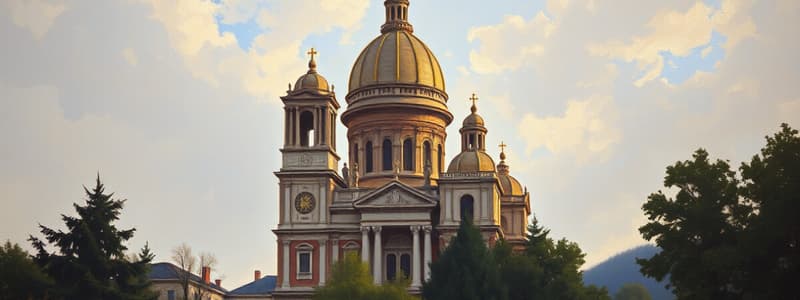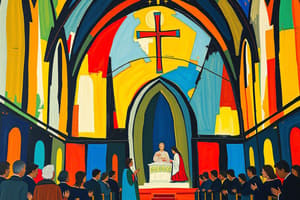Podcast
Questions and Answers
What does 'Catholic' with a capital 'C' refer to?
What does 'Catholic' with a capital 'C' refer to?
- A non-denominational group
- A sect of Christianity
- The Catholic Church (correct)
- Any Christian denomination
What word does St Ignatius of Antioch use to describe the Church?
What word does St Ignatius of Antioch use to describe the Church?
Catholic
What mark begins with God's very act of creation?
What mark begins with God's very act of creation?
Catholicity
Jesus is one ________ ________ with a divine nature and a human nature.
Jesus is one ________ ________ with a divine nature and a human nature.
Who is the Redeemer of all creation?
Who is the Redeemer of all creation?
There is nothing in creation that is good that exists outside of Christ.
There is nothing in creation that is good that exists outside of Christ.
How can one share in the fullness of Christ?
How can one share in the fullness of Christ?
With the grace of Faith present at birth, one is fully incorporated into Christ through participation in the Church.
With the grace of Faith present at birth, one is fully incorporated into Christ through participation in the Church.
How does James Joyce describe the Church?
How does James Joyce describe the Church?
Which New Testament author expressed 'unity in diversity' regarding the Body of Christ?
Which New Testament author expressed 'unity in diversity' regarding the Body of Christ?
What must be protected by the local bishop?
What must be protected by the local bishop?
Who is responsible for drawing diverse groups into an enduring communion?
Who is responsible for drawing diverse groups into an enduring communion?
Who has the obligation to challenge bigotry and racism?
Who has the obligation to challenge bigotry and racism?
According to St. Ignatius of Antioch, which office is essential in promoting the Church's unity?
According to St. Ignatius of Antioch, which office is essential in promoting the Church's unity?
Who teaches and makes judgments about matters of Faith?
Who teaches and makes judgments about matters of Faith?
The bishop represents a diocese just as the pope represents the universal Church.
The bishop represents a diocese just as the pope represents the universal Church.
Who are called to know Christ in the Church?
Who are called to know Christ in the Church?
Who are those fully incorporated into the Church?
Who are those fully incorporated into the Church?
Non-Catholic Christians who do not believe in the Catholic Faith in its entirety remain in communion with the Catholic Church.
Non-Catholic Christians who do not believe in the Catholic Faith in its entirety remain in communion with the Catholic Church.
The Church believes in one Baptism for the forgiveness of sins and generally rejects most Christian baptisms as invalid.
The Church believes in one Baptism for the forgiveness of sins and generally rejects most Christian baptisms as invalid.
Besides Baptism, what other key elements of Salvation are found in non-Catholic ecclesial communities?
Besides Baptism, what other key elements of Salvation are found in non-Catholic ecclesial communities?
The bond between the Catholic Church and the Orthodox Churches is very close to full communion.
The bond between the Catholic Church and the Orthodox Churches is very close to full communion.
Why do Catholics have a deep bond with the Jewish people?
Why do Catholics have a deep bond with the Jewish people?
What truths does the Church share with Muslims?
What truths does the Church share with Muslims?
Study Notes
Difference Between Catholic and Catholicity
- "Catholic" with a capital "C" refers to the institutional Catholic Church governed by the pope and bishops.
- "Catholicity" signifies the Church's universal and all-encompassing nature that began with Creation.
Christ and the Catholic Church
- St. Ignatius of Antioch emphasized that "Where there is Christ Jesus, there is the Catholic Church."
- Jesus is recognized as one divine person, possessing both divine and human natures.
Relationship with Creation
- Jesus Christ is the Redeemer of all creation, extending to both humanity and the cosmos.
- All good in creation exists through Christ, affirming the truth that nothing good is outside of Him.
Communion with Christ
- Communion with Christ is achieved through active participation in the life of the Church, especially through baptism.
- Baptism allows entry into the fullness of Christ, though Grace of Faith from birth does not equate to full incorporation.
Inclusivity of the Church
- James Joyce described the Church with the phrase "Here comes everybody," highlighting its welcoming nature for all individuals.
- St. Paul stressed "unity in diversity" within the Church, emphasizing the importance of diverse gifts without fostering division based on ethnicity or gender.
Catholicity and Governance
- The local bishop, in union with the Pope and college of bishops, is tasked with protecting the Church's catholicity.
- Bishops are responsible for uniting diverse beliefs and practices while valuing the richness of cultural diversity.
Responsibility Against Discrimination
- All Catholics share the duty to confront and challenge bigotry, racism, sexism, and other fears arising from differences among people.
Promoting Unity
- The bishop's office, as emphasized by St. Ignatius of Antioch, is deemed essential for fostering unity within the Church.
- The Pope and College of Bishops hold the accountability of teaching and making judgements that enhance the Church’s Catholic identity.
Relationship Between Bishops and Popes
- Bishops represent their dioceses similarly to how the Pope represents the universal Church.
Membership in the Church
- All people are called to know Christ within the Church, while baptized Catholics obedient to the Pope are fully incorporated into her.
Communal Relationship with Non-Catholics
- Non-Catholic Christians who lack full agreement with Catholic beliefs maintain an imperfect communion with the Church.
- The Church recognizes the validity of baptisms from other Christian denominations and acknowledges other key elements of salvation, including charity and respect for scripture.
Bonds with Other Faiths
- The Catholic Church has a profound bond with the Jewish people, honoring their historical connection to the Old Covenant.
- Shared beliefs between Catholics and Muslims exist, primarily through the acknowledgment of one God, Creation, and divine judgment.
Relations with Orthodox Churches
- The bond between the Catholic Church and Orthodox Churches is very close to achieving full communion.
Studying That Suits You
Use AI to generate personalized quizzes and flashcards to suit your learning preferences.
Description
Explore the differences in terminology related to the Catholic Church and its universal nature in Chapter 4. This quiz focuses on key concepts and definitions associated with the Catholic faith as discussed in this chapter. Perfect for students looking to deepen their understanding of ecclesiology.




